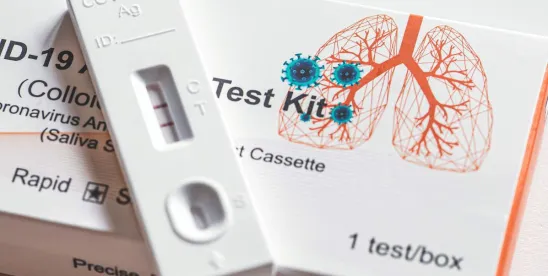On July 17, 2025, the U.S. Court of Appeals for the Fourth Circuit held that a federal district court was “within bounds to order a do-over” in the case of Ron Elfenbein, a Maryland doctor who was found guilty of COVID-19-related health care fraud in 2023 in connection with upcoding and false documentation.
Elfenbein was acquitted by the district court four months after his trial.
The Fourth Circuit affirmed a contingent order of the U.S. District Court for the District of Maryland granting a new trial and also reversed Elfenbein’s acquittal, rejecting the trial court’s conclusion that the jury had too little evidence to convict.
“[W]e do agree that the case was close—and we find it significant that the most damning evidence came not from the government’s witnesses but Elfenbein’s,” Judge Julius N. Richardson wrote for the appellate court.
Following the jury’s guilty verdicts, the district court granted Elfenbein’s motion for judgment of acquittal (MJOA) in December 2023, holding that the government failed to present sufficient evidence from which a reasonable jury could conclude beyond a reasonable doubt that the use of the Current Procedural Terminology (CPT) codes Elfenbein used to bill COVID-19 tests was unreasonable and false.
The district court had concluded that the definitions of the codes were ambiguous; thus the government was required to prove that the Elfenbein’s interpretation of the ambiguous definitions were unreasonable. That court conditionally granted Elfenbein’s motion for a new trial, however, in the event that the Fourth Circuit reached a different conclusion on appeal—which is what happened.
On appeal, the government contested both 1) the district court’s grant of the MJOA and 2) the conditional grant of the motion for a new trial. Federal Rules of Criminal Procedure 29 and 33 allow for an MJOA following a guilty verdict and a conditional grant of a new trial if the judgment of acquittal is later vacated or reversed.
“[W]e ask ‘whether, after viewing the evidence in the light most favorable to the prosecution, any rational trier of fact could have’ convicted….,” the Fourth Circuit wrote. “Because we think the government met that low bar here, we reverse the district court’s Rule 29 decision.”
Background
Elfenbein was convicted in August 2023 of five counts of 18 U.S.C. § 1347 for attempting to defraud Medicare, Medicaid, and other insurers through allegedly high and complex billing rates on COVID-19 tests. The statute penalizes those who “knowingly and willfully” execute or attempt to execute a scheme “to defraud any health care benefit program.”
The defendant co-owned and directed an urgent care center that, during the pandemic, operated mostly as a drive-through clinic and submitted thousands of claims to Medicare and private insurers for patient visits involving COVID tests.
Although the time spent with patients lasted only five or ten minutes—Elfenbein’s goal was allegedly five minutes—the evaluation and management (E/M) services were billed with a CPT code of Level Four on a scale of one to five, with five being the most complex.
The case in question arose from the clinic’s coding of five visits from five patients between March 5 and May 12, 2021, when each patient was tested for COVID-19. Each visit was billed at Level Four, meaning that new patient visits garnered $354.22 each and existing patient visits garnered $231.50 each.
“With nearly 1500 patients coming through on some days, the clinic made millions,” Richardson wrote for the Fourth Circuit.
However, on December 21, 2023, Judge James K. Bredar of the Maryland district court set aside the jury’s guilty verdicts—concluding that the government failed to present sufficient evidence from which a reasonable jury could conclude beyond a reasonable doubt that the use of the CPT codes Elfenbein used were unreasonable and false.
Bredar granted the physician’s motion for judgment of acquittal, as Elfenbein’s lawyers were able to convince the judge that the evidence did not establish that the coding—billed at Level Four out of a possible five—was fraudulent.
Fourth Circuit
On appeal, the government argued that Elfenbein violated Section 1347 through the high-level overbilling and by using fake medical reports to support the codes.
Compounding the problem was that during the pandemic, the Centers for Medicare and Medicaid Services (CMS) and the 2021 CPT Manual removed requirements regarding medical history and examinations from a Level Four E/M code. This left code scoring to be determined by “medical decisionmaking,” dependent on the number and complexity of problems and data, and also on the risks of complications and/or morbidity and mortality.
Testimony from the doctor, his own expert witness, staff, and an auditor was enough, according to the Fourth Circuit, to show that the COVID-19 treatments billed did not correspond to Level Four conditions. “The jury was entitled to conclude that it was fraudulent to code these visits at [L]evel [F]our,” the Fourth Circuit wrote.
Regarding the alleged false documentation, the court said, the patient’s records included services that were not actually performed—and the jury was right to convict it if it found them materially false or misleading.
The Fourth Circuit rejected Elfenbein’s arguments that 1) his interpretation of the CPT codes could not be false, since reasonable disagreement was possible (an argument that the Supreme Court rejected in U.S. ex rel. Schutte v. SuperValu Inc., with respect to pharmacies’ “usual and customary prices”); and that 2) his reasonable interpretations could not be false.
Unlike the District Court, the Fourth Circuit concluded that the CPT Manual was not fundamentally ambiguous, though it might be vague: “[T]he Manual tells us how to deal with linguistic indeterminancy: Follow the usage that prevails among care providers on the ground. The Manual thus presumes—and we agree—that an ‘average person would understand that it is both possible and forbidden to make a false statement by misapplying the codes.’”
It was the jury’s job to decide which interpretation to believe, the court said; and the jury had enough information about CPT codes to apply them in the case.
Further, the “beyond a reasonable doubt” standard did not describe the way district courts should evaluate Rule 29 motions or the way appellate courts review jury verdicts on appeal: “In those contexts, as we have explained, deference to juries requires nearly the opposite rule: While a jury must not convict if it could reasonably acquit, a judge must not order the jury to acquit if it could reasonably convict.”
Finally, the Fourth Circuit further found no abuse of discretion regarding the Rule 33 grant of a new trial, granting deference to the lower court.
Takeaways
At a time when the government is taking health care fraud seriously, the Fourth Circuit case demonstrates that courts, too, will be watching perhaps more carefully than in previous years. CPT codes are complicated—as evidenced by the district court’s December 2023 opinion dissecting the 2020 and 2021 CPT Manuals and COVID-19 guidance. Medical professionals need to understand these complexities and be prepared to defend themselves based on these complexities.
The statute under which Elfenbein was convicted, 18 U.S.C. 1347, requires a specific intent to defraud—“whoever knowingly and willfully executes, or attempts to execute, a scheme or artifice to (1) defraud any health care benefit program.” Thus, a defendant could successfully argue at trial that they had acted in good faith.
But as the Fourth Circuit noted, in “attacking a jury’s verdict, Elfenbein faces an uphill climb”—as the reviewing court merely had to conclude that a reasonable jury could have convicted him of fraud. In this case, Elfenbein was alleged to have not only overbilled insurers for simple diagnoses but to have sent false medical reports to support that overbilling. His own expert testified that “these treatments did not correspond to high-risk diseases,” as did his staff, and the jury had enough evidence to conclude that the medical records supporting the billing were materially false or misleading.
With the increased use of artificial intelligence and algorithms in billing, the need for careful oversight—and defense advocacy raising challenges to these efforts—becomes especially important.





 />i
/>i

